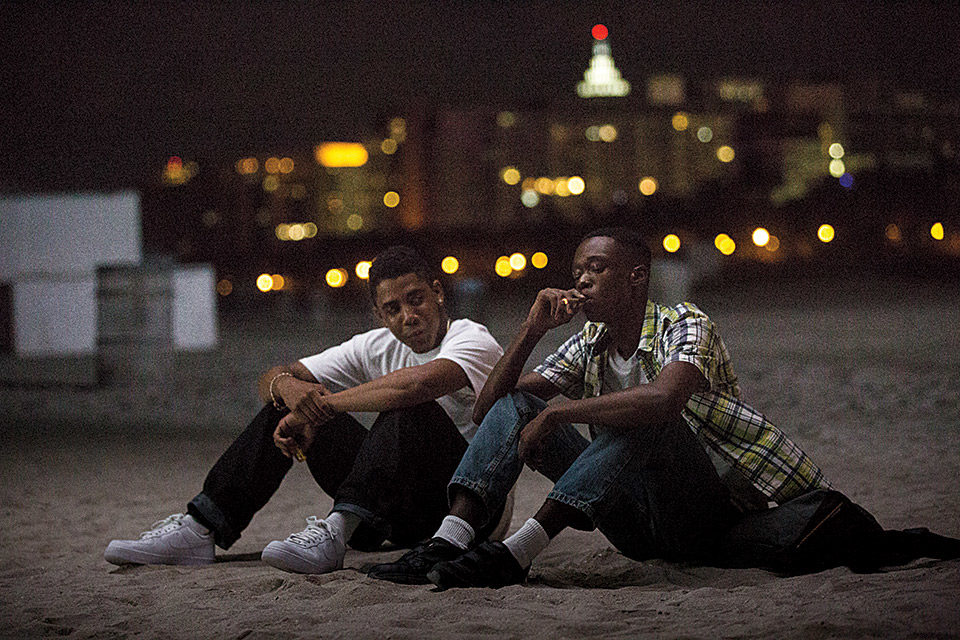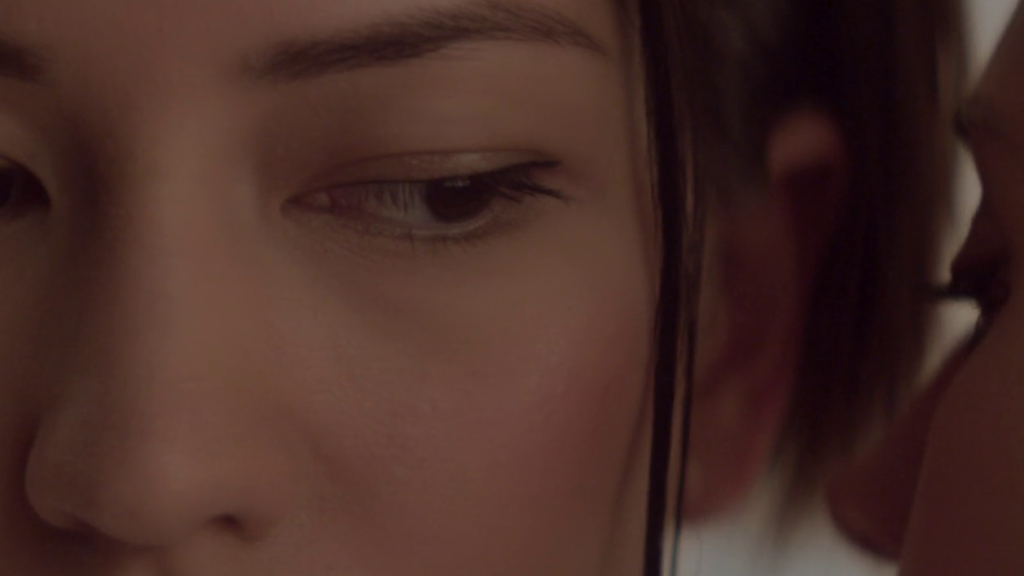
What is film but a medium that asks us to experience worlds — physical and emotional — beyond our own? It’s when it brings us to tears or makes us overflow with joy that film has the possibility of slipping past our defenses to challenge how we perceive the world and maybe even ourselves. The way to accomplish this isn’t to try and tell a story that aims to speak to everyone but crafting one that traffics in specificity. No recent film does that with greater success than Moonlight.
Based on a play by Tarell Alvin McCraney and directed by Barry Jenkins, Moonlight charts the terrain from youth to adulthood of Chiron, a young, black, gay kid growing up in one of Miami’s most notoriously poverty stricken neighbourhoods, in three different chapters of his life. That each actor playing Chiron from childhood, to his teens, to his adult life — respectively, Alex Hibbert, Ashton Sanders, Trevante Rhodes — is able to make their performance seem so seamlessly connected is a testament to their towering skill and the authentically rendered, highly specific milieu that the filmmakers create.
As Moonlight was positioned as the indie underdog at this year’s Academy Awards, with eight nominations—and came home with three wins, including Best Picture—several highly illuminating narratives congealed around the film. Namely that Moonlight is a film whose story “transcends” its specific origin to become “universal”. Variety writer Kristopher Tapley tweeted, “Moonlight’s specificity reaches such a quantum level that it miraculously becomes universal.” Publications like Complex, The Washington Post, and even Andre Holland, the actor who plays the adult version of Chiron’s love interest, have referred to the film as ultimately a universal story.
Sure, if you whittle Moonlight down to its barest emotions and thematic underpinnings, you can deem it universal. Loneliness, desire, and coming into your own identity are common experiences. But to say that Moonlight is universal ignores how these experiences are filtered through identity.
The discussion around Moonlight’s supposed universality betrays a stunning lack of empathy by white and straight critics that suggest the only Black stories that matter are the ones they can see themselves in.
This assumes these emotions and events are all experienced at the same frequency. They aren’t. The undercurrent of this argument is that Black narratives are inherently otherized. It’s as if to say the film itself is “safe” and “worth seeing” for audience members not directly shown in the film itself. The discussion around Moonlight’s supposed universality betrays a stunning lack of empathy by white and straight critics that suggest the only Black stories that matter are the ones they can see themselves in. While the desire to describe Moonlight as universal is likely a well meaning tactic to prove the film’s worth beyond Black audiences, in forcing it to speak to all people critics are doing it and themselves a disservice.

Moonlight’s popularity, which is intrinsically linked to the argument about it being universal, threatens to flatten its complexity about Blackness, geography, identity, masculinity, and sexuality. When I first saw Moonlight I was overcome with emotion in ways I haven’t been while watching a film in years. It took me a while to put it into words for the friend who accompanied me and was worried about my highly emotional reaction to the film. To put it simply: I saw myself up there. The film brought to mind with stunning clarity aspects of my life I have been trying to block out — my upbringing in Miami, my family’s financial struggles, the stunning loneliness of growing up between two worlds as an Afro-Latina. Which is why I find the conversation around the film so troubling. Do these critics and audience members only care about poor, Black, queer people—and particularly those not in popular coastal cities they dwell in—when they can neatly co-opt them?
Here’s a radical suggestion: you don’t need to directly see yourself in a film to empathize with the world it creates. You don’t need to sand off the specific edges of a story in order to say you’ve been moved by it. Loneliness and desire are universal experiences, but the way they manifest are not. Chiron’s grappling with these emotions is filtered through his Blackness, his sexuality, his hometown, his upbringing. Furthermore, stories of Black people don’t need to be universal in order to have broader relevance. The rush to frame Moonlight as such is a desire to say it is safe and worthwhile for people beyond those who are most directly reflected in the story. Often when Black films strive to be universal, and thus divorce themselves from Black audiences, something important is lost.
What is revolutionary about Moonlight is that it makes no room for the white conception of Black identity; that it traffics in such minute specificity that to argue its universality is an act of erasure.
It’s fascinating to never see yourself in pop culture, especially when it’s set in the milieu you grew up in.
Growing up, and even as adult, I have not seen depictions of Miami that venture beyond the slick surfaces of South Beach with its gleaming hedonism, the clinking ice of mojitos, and rows of perfectly tanned bodies. It’s fascinating to never see yourself in pop culture, especially when it’s set in the milieu you grew up in. Beneath the surface of Moonlight is an attack. It challenges people to face their own beliefs about Black identity, Black masculinity, Black love, and Miami itself.

Instead of rising to that challenge, people have smoothed the edges of Moonlight in order to not face their own prejudices around these subjects. White critics and audiences centring their reaction and connection to the film’s themes threaten to blunt this aspect of Moonlight as its place in history is currently being shaped. It’s interesting to watch so many people connect to this film even as they go home to lives devoid of intimate connections with Black people. It’s interesting to watch so many champion Moonlight’s artistry while turning a blind eye to the real-life Chirons struggling just to make it to the next day. It’s interesting to watch so many people fall in love with a film that marks the first LGBTQ work to ever win Best Picture at the Academy Awards only to remain ignorant about trans Black women being killed in our streets and gay kids with no home in which to find solace.
Sharing how much you loved and connected to the film has become an almost theatrical act to prove you care about Black people and the stories that represent them. But Moonlight shines a light on the lives and desires of the Black, the poor, and the queer in a way that can’t be ignored. When it won Best Picture at the Academy Awards, I felt proud and, most importantly, seen. In a beautiful piece for the Huffington Post, writer Zeba Blay discusses what Moonlight’s win means for Black audiences: “La La Land beating Moonlight would have made no sense, and yet, in a world where an Oscar has never been handed to a film centered on Black folks that’s not about racism or slavery, the absurdity of a La La Land win would have been in keeping with the absurdity of the Hollywood machine as a whole. There was a kind of poetic justice in watching [producer Jordan] Horowitz, the man who had just thanked his ‘beautiful blue-eyed wife’ during his acceptance speech, graciously and emphatically concede defeat to the producers of Moonlight. There was an exhilarating beauty in the sight of the Moonlight cast and crew climb [sic] up on the stage, dazed, giddy. It made no sense, but it made sense.”
One of the most moving aspects of Moonlight is how the film explores loneliness, particularly in its second chapter focusing on Chiron as a teenager (played by Ashton Sanders, in what I would argue is the film’s best performance). The way Sanders hunches his shoulders, keeps his gaze rooted to the ground, and moves with an anxious desire to disappear cut me to the bone. Sometimes he’d crane his neck in ways that would remind me of my younger, estranged brother who was wiry and vulnerable to such a degree that his adolescence was marked by profound existential struggles. But the film’s evocation of loneliness is directly coloured by Chiron’s very identity. Is trying to find your place in the world a universal experience? Yes. But to divorce Chiron’s Blackness, gayness, and upbringing in that swath of Miami is an act of cruelty suggesting that Black stories only matter if you personally can see yourself in their contours. A fundamental aspect of Moonlight is how it reckons with Black masculinity, something with which I have no experience in my own identity but which has reverberated through my life in other ways. It made me wonder how my brother would feel about characters like Chiron and Juan, the drug dealer played with stunning complexity by Mahershala Ali. Would he be reminded of how he hid his own vulnerability for fear of attack? Would he see in Juan’s tender first-chapter monologue about being Cuban his own struggles with being Afro-Latino in a milieu that often forgets to acknowledge that racial and cultural identity at all?
In his review for Brokeback Mountain (2005), Roger Ebert wrote: “Strange but true: The more specific a film is, the more universal, because the more it understands individual characters, the more it applies to everyone.” This quote was brought to my attention as a way to refute my argument about praising Moonlight for its specificity rather than forcing it to have a universal message.
While Ebert’s sentiment is lovely, it ignores that emotions may be a universal occurrence but how we experience them is not.
While Ebert’s sentiment is lovely, it ignores that emotions may be a universal occurrence but how we experience them is not. For everyone arguing that Moonlight is universal, I have a few questions for you: Have you ever, as a Black person, walked into a room full of people who looked like you and were from your very community only to realize you had no place there? Have you ever experienced being Afro-Latino stuck between two worlds and found a home in neither one? Have you ever experienced anti-Blackness as an Afro-Latino that made you feel like your very identity was invalid? Have you ever struggled with your sexuality and identity as a Black man so profoundly that you buried it beneath a hardened exterior? Do you know what it is like for the ocean to be the only place in the world that allows you to forget, for a moment, the troubles you have on land? Have you ever looked down at your brown skin and marveled at how beautiful it is in the moonlight?

Moonlight makes no room in its narrative for white interpretations of Blackness. There is no white saviour that rescues Chiron from the whims of his crack-addicted mother (Naomie Harris); there are no racist figures that white audiences could target with easy scorn, making themselves feel better about their own liberalism even as they have monochromatic social groups and find the anger of Black activists distasteful. So white audiences and critics are forcing universailty to exist where there isn’t any by arguing that their ability to connect to Moonlight is the film’s most important attribute.
This doesn’t mean Moonlight can’t move and speak to non-Black audiences. It is a beautifully constructed, expertly realized masterwork. Jenkins and his collaborators deserve all the accolades they have received and then some. But I implore non-Black audiences to allow the film to challenge them and question the rush to call this decidedly hyper-specific film universal. And to see this act for what it truly is: a way to covertly centre the white reaction to an inherently radical Black story in order to argue its worth.
In writing for The New York Times about Beyoncé not winning Album of the Year for Lemonade at the Grammys, Myles E. Johnson wrote something that can apply to all Black art: “Work that gets funding and support is often work that caters to a white audience. If you create a work that does not do so, you are not simply creating a risky product. You are positioning yourself as an opponent to white institutions and business models.” The narrative around Moonlight as an “Oscar underdog”, and ultimately a universal story, is a way for Hollywood and its white power structures to adopt the success of the film as its own. Witnessing it win Best Picture may very well be a sea change in Hollywood if its success inspires the creation of more Black stories that give voice to experiences most commonly met with silence.
Ebert once referred to film as an empathy machine. One of its supreme abilities is to aid us in connecting to people and worlds far beyond those that we move through. But for film to be an empathy machine we have to let it challenge us. You can’t be true to Moonlight without reconciling what it means for the people it directly reflects. Thanks to the bizarre gaffe at the Academy Awards in which La La Land was erroneously announced the winner before Moonlight was revealed as such, Jenkins didn’t have the opportunity to say the speech he had in mind. But in an interview with Entertainment Weekly, he mentioned what he would have said: “[Moonlight playwright Tarell Alvin McCraney] and I are this kid. We are Chiron,” he says, referring to his background as a child from Liberty City, Miami, whose mother once struggled with drug addiction. “And you don’t think that kid grows up to be nominated for eight Academy Awards. It’s not a dream he’s allowed to have. I still feel that way. I didn’t think this was possible.” Jenkins’ proposed speech highlights the power and specificity of Moonlight. This is a film boldly made by and for Black people. To erase this about Moonlight threatens to erase its power, its complexity, and ultimately the film itself.





